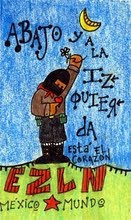Philippine Army Cracks Down Ahead of Vote
Concerns Over Human Rights Intensify as the Military Seeks to End the World's Longest-Running Communist Insurgency
By JAMES HOOKWAY
MORONG, Philippines�The Philippine army's battle to break a decades-old Maoist insurgency is leading to increased military activity as the country gears up for May elections, triggering concerns that the crackdown is undermining the U.S. ally's fragile democracy.
The Philippine military, one of the U.S. Pentagon's primary partners in the Southeast Asian antiterror campaign, has enlisted private militias, and is arresting labor leaders and rural activists, as it steps up its push against the Maoist New People's Army.
Starting in 2006, President Gloria Macapagal Arroyo has instructed the military to end the world's longest-running Communist insurgency before term limits force her from office in June. Swaths of the Philippine countryside have grown heavily militarized, both by the army and by government-backed militias deputized to help pin back the NPA, as well as other rebel groups operating in the south of the country, such as the Islamist Abu Sayyaf terrorist group and the Moro Islamic Liberation Front.
Concerns about the influence of private armies were sharpened in November after a militia in the south of the country ambushed and massacred 57 people, including political rivals, passersby and dozens of journalists. Local politician Andal Ampatuan Sr., and 195 of his followers and family members, face multiple murder charges in relation to the killings.
While those killings in southern Maguindanao province are an extreme example of the kind of things that happen in far-flung parts of the Philippines, activists here say the body-count from state-sanctioned executions has mounted steadily over the past decade. Manila-based human-rights group Karapatan, for example, says Philippine army soldiers or government-supported militias have summarily executed more than 1,000 suspected leftist rebels and activists since 2001. The army says the number is far lower, but doesn't specify the figure.
The United Nations' special rapporteur on extrajudicial executions, Philip Alston, who has studied the killings in the Philippines, has said the army is "in denial" about the extent of the problem and sometimes offers only circumstantial evidence that leftist groups are fronts for the NPA. Defense officials didn't respond to requests for comment on Mr. Alston's position. Now, while independent analysts say the armed NPA is fading, several hard-left politicians with links to the revolutionary movement, such as congressman and senatorial candidate Satur Ocampo, are running in the May 10 vote, and security officials fear their influence over mainstream politics is growing.
Mr. Ocampo was jailed for 12 years in all for being a suspected Communist sympathizer during the dictatorship of late President Ferdinand Marcos, though never charged with a specific crime. Now 70 years old, he still is struggling to shake off the army's accusations that he is working with the rebels.
"Governments led by President Corazon Aquino onwards have called on the militant forces to join mainstream politics, and we've done that," Mr. Ocampo says. "But the military is trying to prevent this. This is the big conflict: The civilian government has allowed the armed forces to intervene in the political process."
Mrs. Arroyo, who came to power in 2001 after the military ousted then-President Joseph Estrada, didn't responded to requests for comment.
Early on the morning of Feb. 6 in Morong, a dusty town a two-hour drive from Manila, soldiers arrested 43 people in what the army hailed as one of the biggest successes in its campaign against the NPA. Prosecutors have charged all 43 with illegal possession of explosives or holding illegal weapons. Lawyers for all 43 of the detainees say they are innocent. All have been denied bail, and it is unclear when their trials will begin.
Two of the group are doctors. The families of 62-year-old Dr. Alexsis Montes and Dr. Merry Mia-Clamor, 34, say they were conducting a medical training course for community health workers�not presiding over a secret bomb-making academy, as the military alleges.
Family members are stunned by the allegations. Dr. Montes's wife, Eveline Montes, says the military told her that her husband was part of an NPA assassination squad. "I just can't accept it. We're from a medical family: Our eldest son is a doctor, another is a dentist and our youngest has just qualified as a physical therapist," she says.
Dr. Melicia Velmonte, a consultant at Philippine General Hospital in Manila and the owner of the property where the detainees were arrested, says she didn't see any sign of explosives when she delivered a lecture there on how to treat infections Feb. 5, the day before the 43 people were arrested. "If I saw any explosives they would have been out of there, believe me," she says.
The Philippines' independent Commission on Human Rights has called on army leaders to justify the arrests and answer allegations that some of the detainees were tortured. The army denies anybody was tortured, and said it has decided to award medals to two soldiers involved in the arrests. "We have to recognize this feat because we are serious in our mission of defeating the Communist insurgency by June 2010," army spokesman Lt. Col. Romeo Brawner says.




